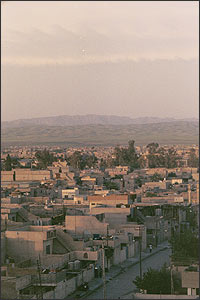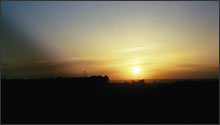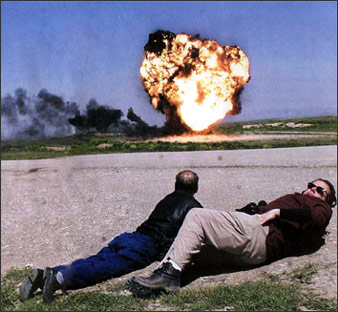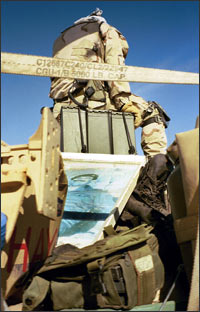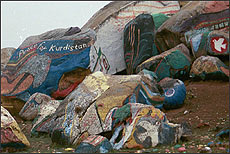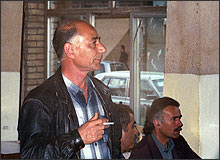

|
By Michael Goldfarb
I arrived in a blizzard and departed in spring. I came through the mountains and left through the desert. In the month I was in Iraq, a whole nation was changed. When I returned to my home in London, nothing was different. The debate about the war was and remains the same: vitriolic and ill informed. Symmetrical experience is what journalists hope for. It means less work trying to understand a story. For us symmetry is measured by expectations being fulfilled. The war in Iraq was symmetrical. It broadly fulfilled our expectations. The overwhelming force overwhelmed. The post-war political plans of the American government proved to be as poorly thought out as we imagined they would be. There was symmetry too in my arrival and departure from the conflict zone. Both entrance and exit were fraught. To get into Iraq I had to travel to Iran. All the other nations on Iraq's borders had closed their crossing points. I arrive in Tehran at 1 a.m. and after waiting for half an hour to get through passport control I am told I must be fingerprinted. I have never been fingerprinted in my life (except possibly at birth) and certainly don't want my prints on file with the Iranian government. I lose my temper, something a lifetime of travel has taught me never to do with immigration officials. The reason I'm being fingerprinted? Last summer, American INS officials detained without charge hundred of Iranian men who were legally in the U.S. They were fingerprinted and held like common criminals in Los Angeles. This was payback.
By mid-afternoon, without opportunity for sleep, I had gone through all proceedings and flown and driven to the Iraq border crossing. It's in the rugged mountains of northwestern Iran. We were told to wait in our cars while Iranian officials checked our papers. While we sat outside in the car, clouds built up and a blizzard began. After two hours in the freezing conditions, I went into the little building where the border officials were sitting in the warmth to ask what was going on. I was told to go back outside. A half hour later I lost my temper again. This stirred up some action. The border official said there was no problem with me crossing into Iraq then asked for 50 dollars to allow my baggage to accompany me. I asked if he would give me a receipt. He gave me a black look. I gave him the money. This was a pay off. ***
Unexplained Phenomena: One day the word went out that there was to be a press conference at the Chwar Chra, Erbil's swankest hotel, featuring Hoshiar Zebari, the main spokesman of the Kurdistan Democratic Party or KDP, and Zalmay Khalilzad, President Bush's special envoy to the region. The starting time came and went. After half an hour most reporters drifted outside to enjoy the brilliant spring sunshine. We heard the unmistakable thud of an explosion, and turned to see a ball of white smoke worming its' way up into the sky a couple of kilometers away. What could it be? A half hour later we were summoned back inside for the press conference. Mr. Khalilzad was nowhere to be seen but Hoshiar Zebari told us about the explosion. The KDP was investigating whether it was a rocket or a bomb placed on the outskirts of Erbil by pro-Saddam terrorists. Of great concern was the fact that the smoke was white. Because, "as you all know," chemical or biological weapons give off a white smoke. The KDP were conducting atmospheric tests to determine if this was the case. We all checked our pulses and monitored our breathing. Nothing seemed out of the ordinary. So we relaxed. We never heard about the bomb again. But we did hear that shortly after it went off the U.S. government provided chemical suits to the KDP. I knew the war was going well when the cost of one of these suits in Erbil's bazaar plummeted from $175 to $35 in under a week. *** Resuming my Symmetrical Exits and Entrances Story:
Leaving Iraq was as fraught as getting in. From early on I knew that my documentary would follow Ahmad Shawkat back to his home in Mosul. The war was effectively over several days before Mosul fell. Ahmad and I went to Mosul twice. Then it was time for me to go. Given my experience getting into Iraq, I had no real desire to leave via Iran. Journalists were being held up on the Iranian side of the border for up to a week before being given permission to fly to Tehran and then onward. I had a valid Turkish visa but the Turks had closed their border crossing with Iraq. So that was out. Syria was close. But the Bush administration was rattling its rhetorical saber at the Assad regime and it just didn't seem like a good idea for an American journalist to be begging his way into Syria at the time. The only border that was open was the border with Jordan. But to get to that border you had to first drive to Baghdad and the road from Erbil to Baghdad wasn't safe. It came close to Tikrit, the last place where the Saddam regime put up resistance. There seemed to be only one way out: hitching an airlift with the U.S. military. Ahmad, our driver Sami and I took the scenic route, one and a half hours through the mountains to the airfield at Harir to make the request in person. An armored brigade from Germany was being flown into Kurdistan piece by piece. Four or five flights a day were bringing men and equipment to Harir and flying back to Germany empty. A lift on an empty flight didn't seem an unreasonable request.
Boy was I wrong. I thought the request could be dealt with locally. But this is the military we're talking about. My request had to be sent to Centcom in Kuwait and then to the Pentagon and then back to Harir. And there was no phone number I could call in Harir. My executive producer, Anna Bensted, had to be the point of contact in all this. She received some fairly condescending e-mails from Centcom. The gist of them was Mr. Goldfarb is not an embedded reporter, so he is not our responsibility. We told journalists "the battlefield is a dangerous place." read one of them. To which I can only respond: I know the battlefield is a dangerous place, and if there was a battle going on I wouldn't be making this request. I would be trying to get as close to the action as possible to observe and report to my listeners what I see. But the war is effectively over and you are flying empty back to Ramstein Germany and this is the kind of reasonable thing Americans do for one another in extraordinary circumstances. I had no qualms about the embed program until that moment. But it's clear that the military views it as a way of creating a two-tier "insider vs. outsider" set up with the press. I hope they realize we all bat on the same team. Anyway, in the time it took to send e-mails and get straight that
the military wasn't going to help out, the road to Baghdad cleared
up sufficiently to exit that way. Although we still had to take
precautions. I say "we" because it wasn't safe to go on
your own, so several journalists decided to travel together in a
convoy. We left Erbil at dawn. The hope was to get past the Arab villages
where there was still fighting before people started waking up.
It was a glorious morning. We rolled at breakneck speed across the
plain that had been our war zone. It was like travelling through
a film set just after production is finished: empty but full of
echoes of what had been enacted there.
There was the Peshmerga camp at Dola Bakir where we watched the distant action in the first days of the war. Empty. We slashed along the road to a place where I recorded Peshmerga destroying land mines. The fields where we walked were now covered with the red triangle warning signs of the Mine Action Group. Lucky I didn't step on one while roaming around there. We zoomed past massive ruined barracks of the Iraqi Army, barracks I had seen from a ridge 15 miles to the east while hanging around with Green Berets as they called in the airstrikes that destroyed them. As the sun rose on the shimmering emerald green plain, the moon was just setting and for one magical moment they shared the same angle in the sky facing each other from east to west with me rushing between them.
The roadside south of Kirkuk was lined with boots and uniforms. The Iraqi Army had literally stripped off its clothes as it melted away. We passed from the green of Kurdistan into the Arabian desert. The change of landscape was immediate. There was perhaps a quarter mile where grass and sand fought each other and then the desert won. We made Baghdad in virtually no time and without incident. It was instructive to see the city. The war in the North was a quiet affair. Not in Baghdad. We came in from the east side of the city. The main boulevard was lined with the detritus of a massive and unfair battle between Iraqi tanks and American attack helicopters. The tanks were precisely and absolutely demolished. Metal coffins for the crews that manned them. Traffic jams were building although there was no electricity, no water, and no place to work. We headed for the Palestine Hotel where I was supposed to pick up a car to take me the rest of the way to Amman. Here, in downtown Baghdad you could see what precision bombing really meant. Government buildings utterly destroyed by airstrikes and residential neighborhoods just behind them untouched. The scene at the Palestine Hotel, where the foreign press was headquartered, was one of panic. The hotel is huge and sits in grounds of many acres. It seemed like every person who had been interviewed by a journalist in the last three months was trying to get in. There were thousands of Baghdadi's waving pieces of paper and business cards demanding to speak to a reporter. U.S. Marines were trying unsuccessfully to keep them out. I felt sorry for the Marines. They had not been trained for this kind of duty. There had already been a couple of suicide bombing attacks on American military personnel in the city and this set up was an open invitation to anyone with a hankering to be a martyr.
I was supposed to share a ride to Amman with British journalist
Patrick Cockburn, but we got separated in the mob. I looked for
him for almost an hour. I returned to where my driver Sami and my
translator Ahmad were guarding my bags. In his poetic English Ahmad
said, "Untie yourself from that man." I didn't know how
to tell them I simply couldn't afford to hire a car on my own and
had to travel with Patrick. But before we could talk further they
found a guy with a 1997 Chevy Suburban touting for business. I hastily said goodbye to my team and set off, although not immediately, for Amman. My driver, being a good middle class young man, had to go home and tell his mother that he was going to Jordan for a couple of days so she wouldn't worry. We roared across the desert and got to the border crossing at R'weisheid. I had one last film set moment: I had been here on the Jordanian side in February reporting on how the war would affect Iraq's neighbors. Obviously, I was not allowed on the Iraqi side of the border station. Now here I was having to unpack all my gear, the gear I paid 50 bucks at the Iranian border to get into Iraq, so Jordanian customs officials could go through it. For me it wasn't difficult but a couple of colleagues were delaying themselves arguing with the customs guys. The Jordanians wanted to seize their maps of Iraq and my journalist friends were objecting with increasing verbal violence. I could have told them for nothing that you should never lose
your temper with border guards. But as you already know, I don't
always follow my own advice. |





